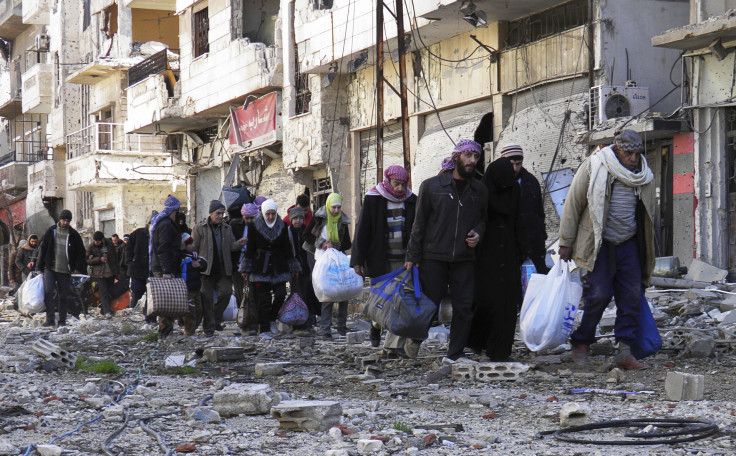Syria Crisis Update: Over 1 Million Syrians Trapped In Besieged Areas, Report Says Challenging UN Estimates

More than 1 million Syrians are trapped in besieged areas, mostly by the government in the suburbs of the capital city of Damascus and Homs, according to a new report Tuesday. The figures challenge the United Nations, which estimates only half that number.
The Siege Watch report, issued Tuesday by the Netherlands-based aid group PAX and the Washington-based Syria Institute, comes a month after international outcry following the release of images showing emaciated children and adults, and the supply of rare convoys of aid to a handful of Syrian communities. The Syrian crisis has deepened as peace talks fell apart last week in Geneva.
"Electricity and running water are usually cut off, and there is limited (if any) access to food, fuel, and medical care," according to the report, cited by the Associated Press (AP). It added that many deaths have been reported in several besieged areas because of malnutrition, disease, hypothermia and poisoning while scavenging for food.
The report says that 1.09 million people are living in 46 besieged communities in Syria, more than the 18 communities mentioned by the U.N. About 200,000 people are besieged by both the Islamic State group and the Syrian government, the report added.
Last month, the U.N. estimated that 486,700 people have been affected in Syria. However, several aid groups have accused the U.N. of underplaying the ongoing crisis in the country.
"Many remain unaware of the extent of the crisis, and the international response has been muted as a result," the Siege Watch report says, according to the AP.
The aid group Doctors Without Borders goes well beyond the figure in the Siege Watch report, estimating that 1.9 million Syrians live in besieged areas. Doctors Without Borders defines a besieged area as one that is "surrounded by strategic barriers (military or non-military) that prevent the regular and safe inflow of humanitarian assistance and the regular and safe outflow of civilians, the wounded and the sick."
The U.N. reportedly said that it considers an area besieged if it is surrounded by "armed actors" and humanitarian aid cannot regularly enter the area, while civilians, including the sick and wounded, cannot enter and exit.
Meanwhile, concerns over Syria’s besieged town come as several countries try to grapple with the growing refugee crisis. On Monday, Turkey and Germany reportedly agreed to set measures to tackle the influx of refugees and hold a joint diplomatic initiative to halt attacks against Syria’s largest city of Aleppo.
German Chancellor Angela Merkel, who was in the Turkish capital of Ankara Monday for talks on how to reduce the influx of refugees into Europe, said after discussions with Turkish Prime Minister Ahmet Davutoğlu that she was "not just appalled but horrified" by the suffering caused by Russian bombing in Syria. Peace talks are reportedly set to resume by Feb. 25.
Over the past two weeks, the Syrian government and the Russian military forces have carried out daily airstrikes in Aleppo forcing thousands of Syrians to flee the violence.
About 4.6 million people have reportedly fled Syria since the civil war began in 2011. Another 13.5 million are said to be in need of humanitarian assistance inside the country as tensions escalate in the region.
Turkey is currently facing immense pressure from the European Union to open its border to up to 35,000 Syrians who are stranded near the Turkish border. Turkey’s Deputy Prime Minister Numan Kurtulmus said Sunday that the country now has a total of 3 million refugees, including 2.5 million Syrians.
© Copyright IBTimes 2024. All rights reserved.





















